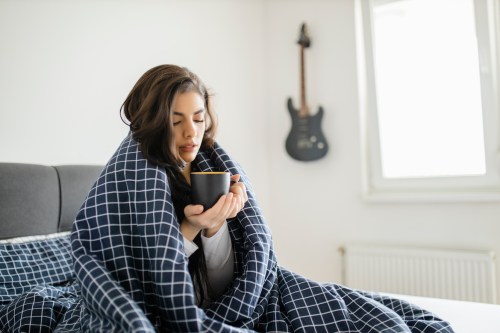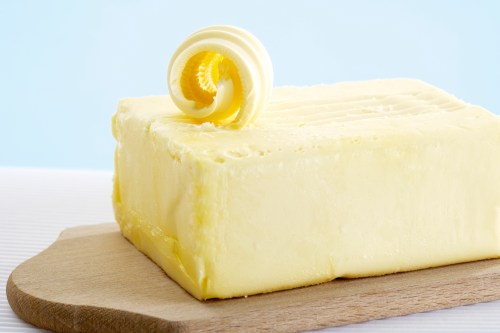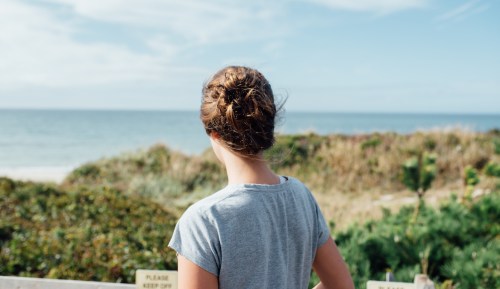When you’re under the weather, chances are there’s not much you won’t do to start feeling like yourself again. (Even—gulp—throwing out your favorite, newly germ-infested red lipstick.) But giving up coffee? If you’re a daily java drinker, that’s a tough call to make.
Experts in This Article
registered dietitian based in Nashville, TN
The truth is, there are pros and cons to drinking coffee when you’re sick. In some ways, it can hinder your body’s ability to bounce back. Scientific studies have repeatedly shown that coffee can impact sleep1—even when consumed six hours before getting into bed. (Unless you’re brewing decaf, coffee is definitely full of caffeine.) That’s not exactly great news when you’re trying to get back to “normal.” But coffee also has some properties that can get you up and running. Scientific studies have shown that caffeine is linked to helping with both immune health and preventing inflammation2.
So what’s the verdict? To settle the caffeine-or-cough syrup dilemma for good, I consulted Nashville-based dietitian Jenny Beth Kroplin, RD. Trust me when I say you’ll want to keep her thoughts in mind next time you feel the sniffles coming on.
Should you drink coffee when sick?
Let’s start with the bad news. Unfortunately, caffeine can be dehydrating—and, as you’ve probably heard, the golden rule of getting over a bug is hydrate, hydrate, hydrate. “While you’re sick, it’s very important to stay on top of hydration to help the body thin mucus [and] replace fluids lost,” Kroplin says. So, is coffee good for mucus in throat? Not so much. Due to coffee’s dehydrating properties, it can result in even thicker mucus buildup—which isn’t particularly fun if you’re already feeling extra congested.
Plus, coffee and illness don’t exactly mix well together when it comes to getting adequate rest, either. A caffeine hit can interrupt your sleep, which also makes it a risky beverage choice when you’re sick. You probably know that getting enough rest is major for overall health, but it’s especially crucial when you’re not feeling well—research shows that your immune system is at its best when you’re getting enough zzz’s, and coffee can potentially mess with your shut-eye.
It’s also worth noting why coffee can upset your stomach, which can further exacerbate your ailments. Health experts explain that the high acidic content of coffee can throw levels off-balance in the stomach and result in indigestion or heartburn, which aren’t ideal when sick.
What happens if you continue drinking coffee when sick
But it’s not all buzzkill (literally). The good news? Coffee actually has some merits when it comes to feeling better. “Coffee is a rich source of disease-fighting polyphenolic antioxidants,” Kroplin says.”Research suggests the antioxidant activity3 from coffee, specifically from ferulic and caffeic acids, has anti-inflammatory, antibacterial, and antiviral effects,” she says. “This can all be helpful to the body in healing from an illness.”
Plus, the polyphenols4 in coffee may be helpful in reducing inflammation. “When we can reduce inflammation in the body, [this] can help set the stage for healing and wellness,” Kroplin says.
But the most obvious benefit of coffee when you’re sick is—you guessed it—an energy boost. One study found that coffee helped reduce the general “malaise” associated with colds. In the study, 46 people with colds were given either caffeinated coffee, decaffeinated coffee, or fruit juice. The study participants who had caffeinated coffee reported increased alertness and performance that was the same as a group of non-sick subjects. (The sick participants who had decaf coffee also saw improvement). “The caffeine from coffee can actually help offset that sluggish feeling and boost your mood,” Kroplin says. And that’s especially beneficial if you just can’t take a sick day from work.
Plus, if you’re not actually sick and simply dealing with seasonal sniffles, drinking coffee for allergies might help with keeping your energy levels on track when you’re feeling sluggish as ever. A win-win.
The verdict
Bottom line? If you’re a regular coffee drinker, there’s no need to skip your usual java—and deal with all the additional symptoms that would bring—just because you’re sick. “If a warm, comforting cup of joe sounds good, have one,” Kroplin says. Chances are, if consumed in moderation, the effects won’t be too grave.
What to drink when you’re sick?
If you’re wondering what to drink when sick? Kroplin says sticking to less than two cups per day of coffee when you’re feeling under the weather is recommended. And, if you’re really concerned with the potential effects of the caffeinated beverage, try switching to half-caf or decaf to reap all the coffee health benefits minus the jitters.
To avoid disrupting your sleep, try not to have it late in the afternoon, and make sure you’re hydrating throughout the day with other drinks, too—Kroplin recommends jumpstarting your morning with a big glass of water pre-coffee, and you can also sip on herbal teas or broth. “In moderation, coupled with other hydrating beverages like water, coffee stands to actually help the body heal both physically and emotionally,” Kroplin says. Because sometimes, a hot cup of comfort (at the ideal coffee temperature in winter) is just what the doctor ordered.
That said, there is one major, major caveat to all this advice: If you’re taking medication.
Medications to avoid mixing with coffee
If you’re cooped up in bed, it’s very likely that you’re either taking an over-the-counter medicine or something prescribed to you by a doctor. In both cases, it’s important to know that some medications are not meant to be combined with coffee. Here’s a run-down of the ones to be especially mindful of because they should not be combined with coffee:
1. Ephedrine
Ephedrine and coffee are both stimulants and taking both can increase blood pressure. Ephedrine is commonly found in decongestants, so if you’re taking one, be sure to read the label before brewing your morning cup.
2. Theophylline
Theophylline isn’t technically a stimulant, but there are some qualities about it that are similar to caffeine. Chemically, the two are structured very similarly. That’s why you want to avoid having them both at the same time. Otherwise, you’re putting yourself at risk for experiencing a racing heart—not fun when you’re already feeling pretty horrible.
3. Echinacea
This herb is commonly found in medications because it’s immune-supporting as well as helpful in relieving pain. But according to researchers, it can also make caffeine more concentrated by increasing the amount it takes the body to break down the caffeine, resulting in a more prolonged effect. The end result could once again be a racing heart and increased blood pressure.
TL;DR?
Still unsure about whether or not you should have someone hit up Starbucks for you? Always remember that there are other comforting drinks you can savor too. Tea with honey (what one RD recommends to anyone who is under the weather) just might be the replacement you need to feel better. Or, hey, maybe you’re desperate for some joy, and for you that comes in the form of java and nothing else will do. That’s fine too—just remember to check your medications. Soon, you’ll be back up and running. Just think how happy your local barista will be to see you.
How to make a coffee replacement to drink until you feel better:
Drake, Christopher et al. “Caffeine effects on sleep taken 0, 3, or 6 hours before going to bed.” Journal of clinical sleep medicine : JCSM : official publication of the American Academy of Sleep Medicine vol. 9,11 1195-200. 15 Nov. 2013, doi:10.5664/jcsm.3170
↩︎Loftfield, Erikka et al. “Associations of Coffee Drinking with Systemic Immune and Inflammatory Markers.” Cancer epidemiology, biomarkers & prevention : a publication of the American Association for Cancer Research, cosponsored by the American Society of Preventive Oncology vol. 24,7 (2015): 1052-60. doi:10.1158/1055-9965.EPI-15-0038-T
↩︎Yashin, Alexander et al. “Antioxidant and Antiradical Activity of Coffee.” Antioxidants (Basel, Switzerland) vol. 2,4 230-45. 15 Oct. 2013, doi:10.3390/antiox2040230
↩︎Hussain, Tarique et al. “Oxidative Stress and Inflammation: What Polyphenols Can Do for Us?.” Oxidative medicine and cellular longevity vol. 2016 (2016): 7432797. doi:10.1155/2016/7432797
↩︎Smith, A et al. “Caffeine and the common cold.” Journal of psychopharmacology (Oxford, England) vol. 11,4 (1997): 319-24. doi:10.1177/026988119701100406
↩︎
Sign Up for Our Daily Newsletter
Get all the latest in wellness, trends, food, fitness, beauty, and more delivered right to your inbox.
Got it, you've been added to our email list.









